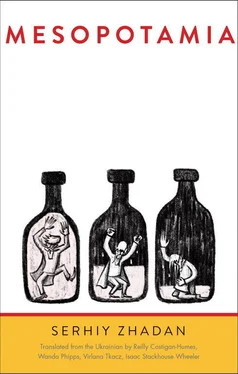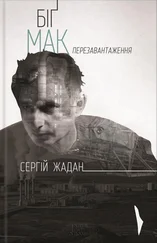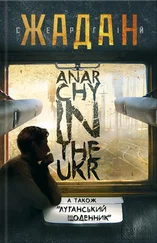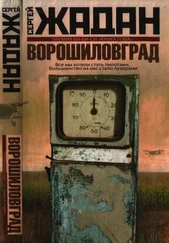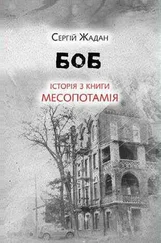“All right,” he said, “I don’t give a fuck about you guys. You’ll live to see another day.”
Somebody suggested going around the corner to get a better view, so they did.
(One time, a hitchhiker tried to strangle Danylo. That was before he started working for the taxi company—it was pouring out and he saw some young guy on the side of the road, so he decided to stop and pick him up. It turned out they were heading the same way. The guy sat in the back, which was a bit weird, but Danylo thought nothing of it. While they were crossing the bridge, Danylo had to brake, and the guy leaned forward sharply, ramming his elbow into Danylo’s neck, locking his hands together, and pulling with all his strength. The startled Danylo slammed on the brakes again, sending the guy flying, head first, into the windshield. Then Danylo heaved him over his shoulder and dragged him out into the rain. The guy looked at him, eyes all glassy, showing no hint of fear, no hint of any feelings at all. Sitting there in a puddle, he looked up at Danylo and muttered, his voice hissing with hate,
“Fag, fuckin’ fag, you’re such a fuckin’ fag.”
Danylo snapped—maybe he was just tired, maybe it just pissed him off that he went to the trouble of picking a guy up only to get called a fag. Danylo kicked the youngster right in the head, which he truly wasn’t expecting from himself. He did it again and again, he just didn’t have it in him to stop. The guy ducked his head, trying to cover it, and eventually tipped over. His head fell in the water, his eyes were bloody, and foam was coming out of his mouth. Danylo got scared; he even thought about just leaving him there, but something compelled him to lug the guy—all dirty and wet—back to his car and drive him to the emergency room. When he was talking to the doctor, he just said that he’d picked him up off the side of the road. The doctor took one look at him and figured it all out.
“Did he hit you or something?” he asked, seeing the bruises on Danylo’s neck.
“He tried to strangle me,” Danylo admitted.
“Did you do it to him, too?”
“Nah, but I kicked him a few times.”
“Drugs. It seems like you knocked his eye out. He’ll live, like that’ll do anybody any good.”
“What are we gonna do?”
“Nothing. We’re not gonna do anything. You have to learn to control yourself. Sometimes our perception of the harm done to us pales in comparison to how much our conscience will torture us for the rest of our lives. But at the very least, you don’t realize that until you’re near the end of your life. Get going. You weren’t here, I’ve never seen you before.”)
He could also have thought about hurt feelings and jealousy, about the need for revenge, about the rage in his voice, about her scornful silence, about the disappointment she didn’t even try to hide. He couldn’t understand what she needed that soccer player for—he couldn’t even tie his shoes—or where the hell he’d even come from. She shouted at him to quit sticking his nose in her business, that she didn’t need him bossing her around, and that he should just beat it. He did, but then he called, and they argued until he ran out of money on his phone and she ran out of patience. Oleh was planning on tracking down that soccer player to tell him that Sonia was his, and he’d better make himself scarce; he was planning on it (he really was!), but he didn’t follow through for some reason—maybe she talked him out of it (“Relax, it’s just a little fling, you’ll see for yourself”), maybe he realized that the soccer player had nothing to do with it, he wasn’t the one breaking them up. She was the problem. You couldn’t even talk to her; she was used to doing whatever she pleased, she was always the one calling the shots, and nobody had any sway over her—her dad was out of the picture, her mom had died a few years ago, and the therapist she saw every week, another object of jealousy for Oleh, didn’t really seem to get her, so who had any sway over her? Who could reason with her? “Everything’ll work out,” Oleh said to himself. “She’s a high-powered businesswoman, after all, she’ll figure things out, sooner or later. She’s not just gonna go and ruin her life. Everything’s going to be like it was before—she’ll keep ripping my heart out, writing me love letters in the afternoon, cursing me up and down in the evening, and telling me her dreams in the morning—they make no sense, they’re too simple and too sublime.”
They walked down the street and turned up the hill. They passed the Institute, dark buildings, and the empty schoolyard. They stopped by the kiosks. Danylo bought some sparkling water to wash his cuts—the bubbles hissed, as if his skin had come to a boil.
“Doin’ all right?” he asked Oleh.
“Yeah.”
“Ya sure?”
“Yep.”
“Well all right, then.” Danylo took out his cigarettes and handed one to his brother.
They had a smoke, patted each other on the back, and went their separate ways.
Then again, he could have thought about that morning two days ago or its low-hanging fog sticking warmly and waxily to the pines, making the forest invisible and treacherous. The dark skeleton of their building stood in a clearing, in the middle of a field, like a half-finished battleship. Oleh slept in the trailers, right alongside his construction crew, like a true captain, sharing canned food, bread, and alcohol with his cheerful and mischievous band of pirates. It was the alcohol they were most interested in sharing that night; it went on until the early morning, and then Oleh told everyone to get some shut-eye.
“No days off for us,” he said. “This is a big client shelling out the big bucks, three hours of sleep, then reveille—we’ve got a construction timetable to think about.”
But no sooner had he fallen asleep than he was awakened by his phone. It was Danylo.
“Did ya know,” he started, “that your friend is getting married to that guy tomorrow?”
“What friend?” Still drowsy, Oleh wasn’t following.
“Your friend, Sonia. Her wedding’s tomorrow. I gave her relatives a ride into town from the train station. They had this fat jerkoffy kid with them, too. Did you know they were getting married?”
“Of course I did,” Oleh assured him.
He got up and dressed quickly, putting on his work clothes and a jacket—a cold patch of air was coming out of the woods—woke up the foreman and told him he wouldn’t be back for two days, and brushed his teeth with icy water, realizing that his breath still reeked of alcohol, so he’d have to take the train. “Well, it’s no big deal. A five-hour trip and then I’ll be home,” he thought. He went over to the village and asked for a ride to the station. Someone agreed to take him, and they navigated the fog and murk. He’d missed the night train; the next one wouldn’t be for another two hours. Oleh sat down on a bench and fell asleep. A cop woke him up, demanded to see some ID, spent a long time checking his picture, and called somebody to make some inquiries; it was only then that he got around to telling him that there wouldn’t be any train today because it only ran every other day. Then they agreed that the officer would drop him off on the main highway. Nobody wanted to pick up some dude mired in the fog, dressed in heavy hiking boots and a shady-looking jacket. Pissed off and unshaven, he lay down in the grass, slept for a bit, and then called Danylo to ask for a ride. His brother had no problem with helping him out, but Oleh couldn’t explain where he was standing, or, more precisely, where he was lying. A truck finally picked him up in the afternoon; the driver agreed to drop him off at the nearest bus station, refusing to take any money, because Oleh looked so worked up. When he got to the station, it turned out that the evening bus wasn’t even going to run its route—there weren’t any passengers. Oleh offered to pay the driver triple the regular fare but got turned down anyway. Oleh headed over toward the taxi drivers, who took one look at his stubble and the blood and cement caked on his boots and turned him away too, all but one of them, who said they’d be leaving at ten, because he had to wait for a regular customer of his who’d be arriving on the Rostov night express and bringing him a little treat. That’s what he said—a little treat—like it was a chocolate cake or something. Oleh agreed to wait and then went over to the snack bar. The taxi drivers all followed him in, standing at the counter next to him and listening closely to his silence. They left at ten, driving slowly and stalling occasionally. The driver was anxious, and so was Oleh. They covered the first hundred kilometers. They were so close. Right at the city limits, as the car was struggling up yet another hill, it started smoking. The driver opened the hood so despairingly that Oleh paid him the full amount and started walking. “No biggie,” he said to himself, “keep going at a good clip and you’ll get to the metro in a few hours. You’ll be there by morning.”
Читать дальше
